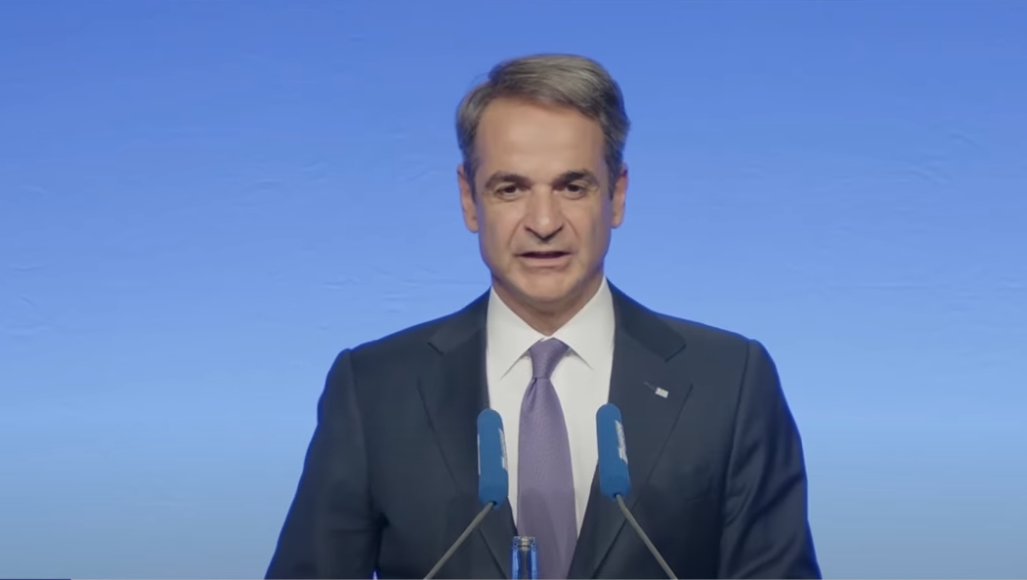Mitsotakis awarded in Berlin for Greece’s ‘economic miracle’ – Faces awkward praise for six-day working week

Chancellor Merz began his remarks by congratulating Mitsotakis: “What has been achieved in your country is truly significant, and I sincerely congratulate you on these great successes in recent years.”
After receiving the award, Mitsotakis began his speech with grand statements, saying:
“Indeed, there were great difficulties and sacrifices, but at the same time, the Greek people were courageous, accepting change and proving to be resilient. They never gave up on their promise of a better future. There was a time, as you rightly pointed out, when Greece was often seen, even in this very city, as Europe’s problem child. Our ability to implement reforms was questioned.”
Continuing with a tone of self-praise, he added, “Our intentions were unclear to many, and even our place within the European family was in doubt. Yet, this country, which was met with great skepticism in Germany, is now recognised for its determination, discipline, resilience, and capacity to implement difficult reforms.”
On the issue of tax evasion, Mitsotakis repeated his claims that:
“By using digital tools to tackle tax evasion, as we have done, we can bring in more revenue from those who previously didn’t pay taxes. Of course, there were reactions at first. Now, as we generate additional revenue and return that economic dividend to the citizens, they understand that this reform works.”
He then returned to the subject of job creation, proudly stating, “But what is most important is that this progress is reflected mainly in job creation. Over the last six years, we’ve created 500,000 new jobs in Greece, and I believe this is the most significant achievement of our economic policies.”
Concluding his speech, Mitsotakis framed the award as a collective national victory, seemingly ignoring the reality most Greek citizens face. He also invited further foreign investment into the country. He said, “Today has been an emotional evening as it allowed me to reflect. The difficult journey, which for many seemed unimaginable, but I believe we’ve managed to win that bet. I am happy tonight to share our story and invite businesses to see Greece as an investment destination. I accept this medal on behalf of the Greek people. I sincerely thank you for the recognition, Friedrich, and I truly look forward to working with you and your government. I thank everyone for their trust in Greece.”
Merz praised Mitsotakis for the “return to the six-day working week “
During the joint press conference, a journalist asked Chancellor Merz what Germany could learn from Greece’s success story. Merz inadvertently revealed Mitsotakis’s government’s shift towards a six-day workweek, something the PM has never openly acknowledged. Merz said:
“We have carefully followed what Greece has done. The return to a six-day workweek. It’s impossible, unthinkable in Germany. But even small changes… We shouldn’t just talk about an eight-hour daily limit, but about a weekly limit on working hours. This is a step that shows we’re ready to do more, to work harder. Anyone who thinks that working 40 hours a week is unthinkable in Germany should take a look at Greece. They’ve gone far beyond what we’ve done in terms of weekly working hours. We can really learn from Greece.”
Mitsotakis, visibly uncomfortable, continued to deny the government’s role in legitimising the six-day workweek. He responded:
“I want to thank the Chancellor for his kind words. But just to clarify, the five-day workweek is legally protected. However, we’ve introduced flexibility in labour laws to ensure workers’ rights are safeguarded while supporting business productivity.”
Mitsotakis: “In Greece, there is absolute freedom of expression”
In response to a journalist’s question regarding press freedom in Greece, Mitsotakis seemed puzzled. The Deutsche Welle journalist asked:
“For the fourth consecutive years Greece has come last in the European Union in terms of press freedom. What is your response to that and what will you do about that?”
This was based on recent reports from Reporters Without Borders and Human Rights Watch.
Mitsotakis, however, insisted that “Greece is a democracy that functions very well and only the European Commission can judge on the state of the rule of law in our country.”
He went on to say:
“It’s very strange to me that in some press freedom rankings from various NGOs, Greece – a well functioning democracy – ranks lower than some African countries, which are not particularly known for their democratic reflexes.”
He further claimed:
“In Greece, anyone can say and write whatever they want. There is absolute freedom of expression. I also assure you that the criticism directed at my government, as is fitting in any democracy, is very intense, and we accept that this is part of how well-functioning democracies operate, like ours.”
Why is Greece the worst EU country for Press Freedom for the fourth year in a row?
DW Chief Political Editor @MKuefner asks Greek Prime Minister Kyriakos Mitsotakis what he plans to do about it. Watch him praise Greece and reject the Reporters without Borders ranking. pic.twitter.com/Ce6u50er58— DW Politics (@dw_politics) May 13, 2025
It should be noted that the 117-page report from Human Rights Watch, titled “From bad to worse: The deterioration of media freedom in Greece”, documents the hostile environment faced by independent media and journalists since the New Democracy government took office in July 2019. The report highlights harassment, intimidation, surveillance, and abusive lawsuits, all contributing to self-censorship and hindering media freedom. Human Rights Watch also found that state funds were used to steer media coverage and editorial intervention in public media, further exacerbating the situation. These conditions undermine freedom of expression and the public’s right to information.
______________________________________________
Are you seeking news from Greece presented from a progressive, non-mainstream perspective? Subscribe monthly or annually to support TPP International in delivering independent reporting in English. Don’t let Greek progressive voices fade.
Make sure to reference “TPP International” and your order number as the reason for payment.